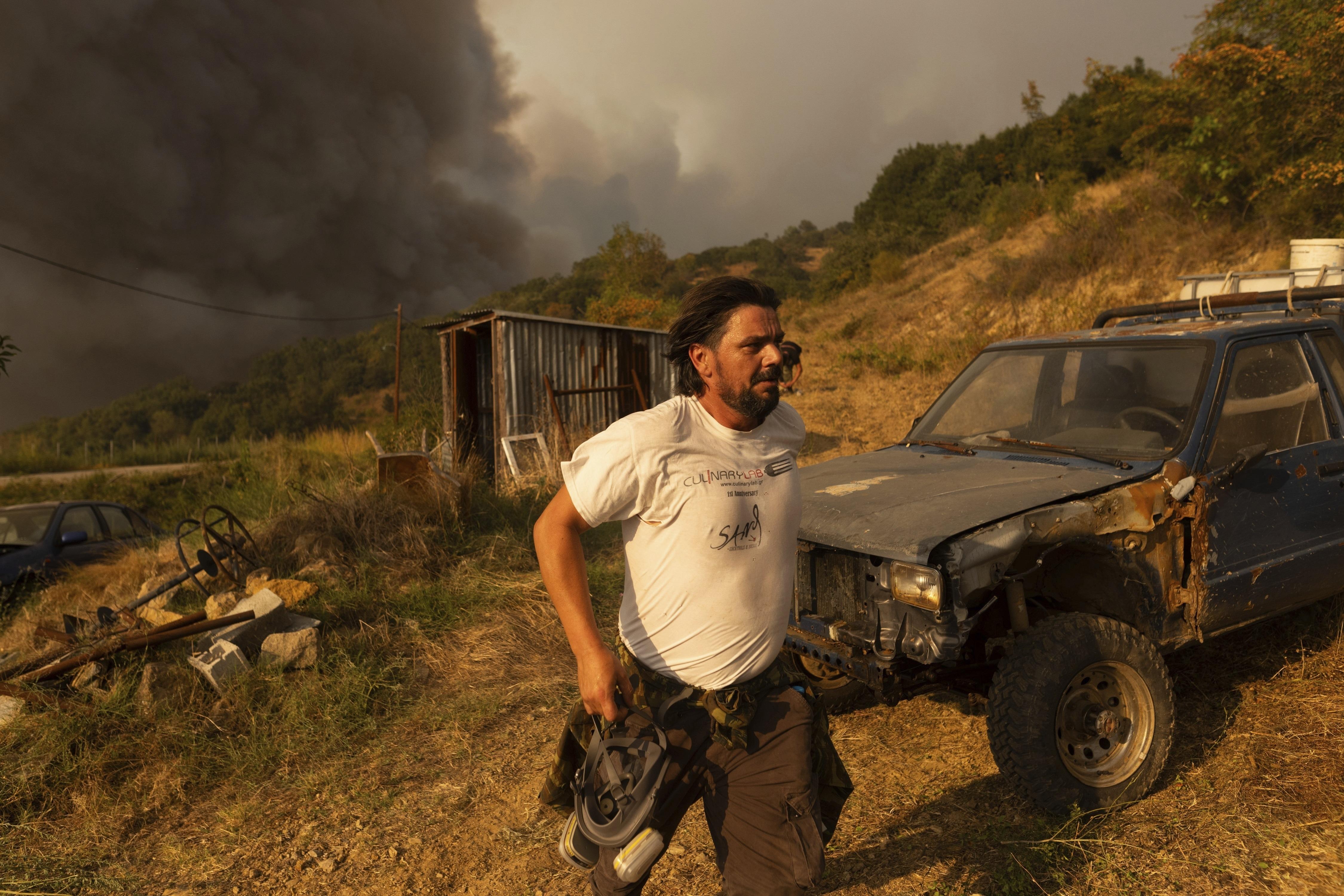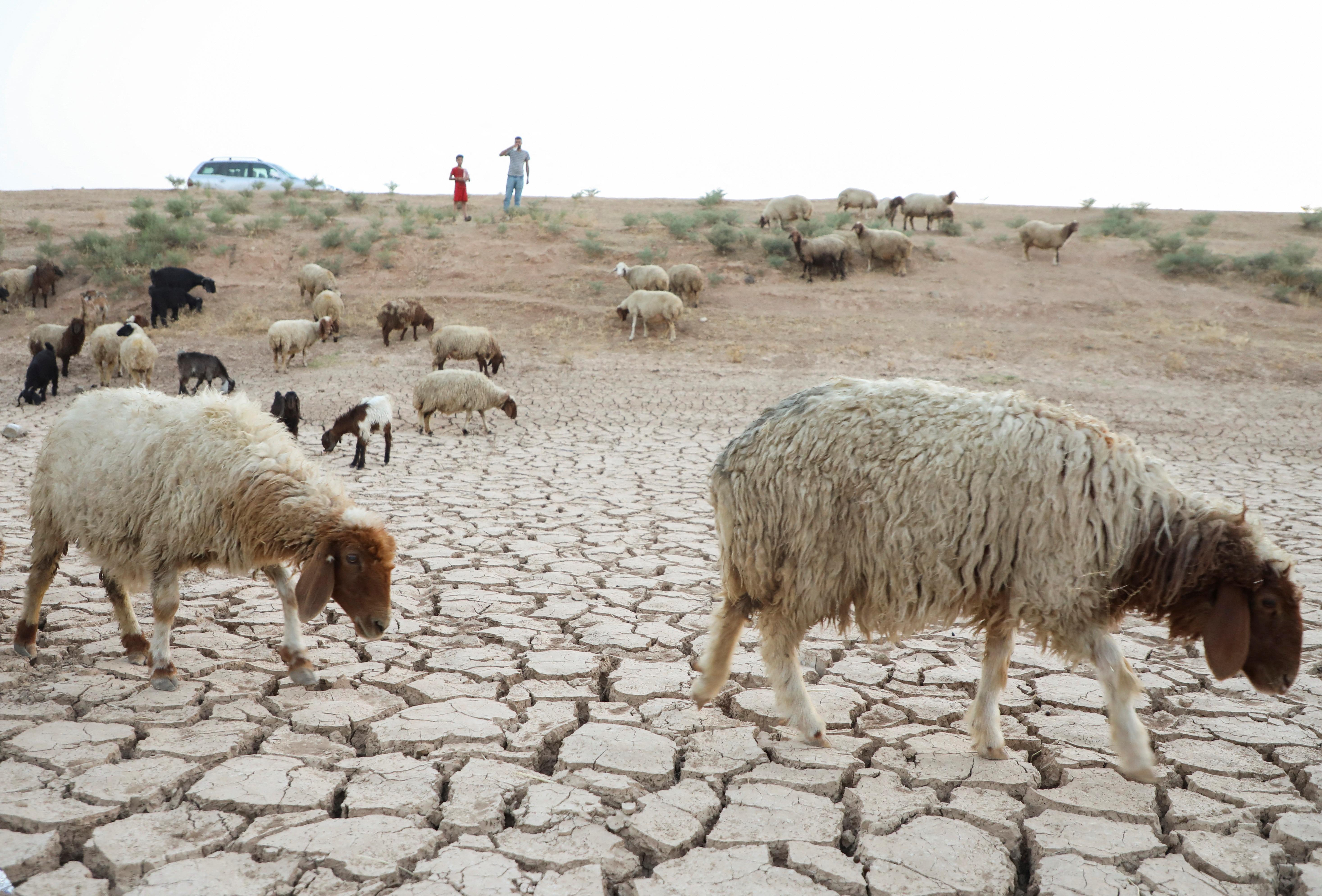Experts warn of devastating impacts on agriculture and livelihoods
 A man walks away as a forest burns during wildfires in the village of Sykorrahi, near Alexandroupolis town, in northeastern Greece, on Wednesday. (PHOTO / AP)
A man walks away as a forest burns during wildfires in the village of Sykorrahi, near Alexandroupolis town, in northeastern Greece, on Wednesday. (PHOTO / AP)
Editor's note: The staggering rise in the number of global extreme weather events demands greater international efforts to reduce climate change impacts. This page reviews experts' observations, analyzing how these issues affect global migration, food security, infrastructure, and geopolitics.
When Alicia Wang traveled to the northern part of Italy, she never expected to encounter a horrible hail.
"The northern part of Italy has a Mediterranean climate and it seldom rains in summer, let alone hail," she said.
"However, when we arrived there, suddenly, there was strong wind, and then it started to hail and rain. The hail was as big as a plum, which shocked even local people who had never seen things like that happening in the region before."
Wang, having worked in Rome, Italy, for four years, notably observed a rise in frequency and intensity of extreme weather events in the country.
In the southern part of Italy, wildfires are getting more frequent in summer and are beginning to spread to the central parts, she said.
Ma Jun, director of the Institute of Public and Environmental Affairs, an environmental group in Beijing, said this year has again witnessed a significant increase in extreme weather events around the world.
From blistering heat waves and severe droughts to devastating hurricanes and rampant wildfires, the impact of climate change is becoming more evident.
Under the influence of global warming, extreme weather events such as heat waves and floods may become Europe's "new normal" in summer and have increasingly affected the European population, economy and nature, the European Environment Agency said in a recent report.
Between 1980 and 2021, weather- and climate-related extremes caused economic losses estimated at $606 billion in the European Union, while nearly 195,000 fatalities have been caused by floods, storms, heat and cold waves, forest fires, and landslides, the agency said.
More than 600 firefighters, including reinforcements from several European countries and backed by a fleet of water-dropping planes and helicopters, were tackling three major wildfires in Greece on Sunday, two of which had been raging for days.
In the past week, Greece has been continuously troubled by numerous fires as strong winds and dry summer weather have fueled the flames and made firefighting efforts more difficult.
On Sunday, there were a total of 105 wildfires being fought across the country, with 46 of them starting within a 24-hour period between Saturday evening and Sunday evening, the fire department said.
Italy also experienced its third major heat wave this summer, with 17 of its 27 largest cities on "red alert" for heat.
Europe's soaring temperatures are also hitting the region's highest peak, Mont Blanc, heightening the risk of rockfall and new crevasses opening on its glaciers, rescuers and climbers said on Wednesday.
In the United States, the Maui wildfires in Hawaii on Aug 8 have killed at least 115 and left hundreds of others missing, making them the deadliest in the US in more than a century. The fires also destroyed forests, wildlife habitats, and cultural sites.
Many other regions across the world have also experienced record-breaking temperatures and precipitation patterns, leading to disruptions in agriculture, infrastructure damage, and threats to human health and safety.
Qu Sixiao, senior project manager of the global consultancy Roland Berger, said extreme weather events are caused by the overall climate change, and the core reason for climate change is excessive greenhouse gas emissions from human activities since the industrial era, which surpassed the capacity of the environment.
 Sheep walk on cracked ground at the Khabur River during a drought in Tel Tamer, northeastern Syria, on Aug 15. (PHOTO / REUTERS)
Sheep walk on cracked ground at the Khabur River during a drought in Tel Tamer, northeastern Syria, on Aug 15. (PHOTO / REUTERS)
Rising sea levels
Climate change has two main impacts, he said. On the one hand, it contributes to the rise in global temperatures, which, in turn, leads to increased sea levels, melting of polar ice, and so on.
On the other hand, because of global warming, certain areas are experiencing a significant increase in extreme weather events, including intensifying temperature variations, enhanced precipitation, and a rise in severe storms or hurricanes.
Extreme weather events can have a significant impact on the comfort, efficiency, and safety of individuals in their personal lives and work, Qu said.
"They also possess strong physical destructive properties, which can result in significant property damage caused by accidents such as floods and landslides. In the longer term and on a larger scale, extreme weather events have the potential to reshape global geopolitical relations, because some countries may even be submerged by the rising sea levels."
Monika Tothova, an economist at the Food and Agriculture Organization of the United Nations, said extreme weather events and changing weather patterns have implications on agricultural production as well as the processing and transportation of food.
Some geographic areas might become more hostile to agricultural production, while weather conditions in others might make them more suitable, she said.
Transportation links might also be affected if, for example, rivers used to transport goods become seasonally too shallow to allow navigation.
"Overall, the keyword remains 'uncertainty': Uncertainty of changing temperatures, rainfall, and weather patterns," she said. "Thus, the food systems' transformation is also aimed at making them more resilient to the effects of climate change. There is much ongoing work in the area to increase the resilience of the agricultural sector by enhancing adaptation and mitigation measures."
Precise and comprehensive estimates of damages caused by extreme weather events — for example, recurrent drought in East Africa and floods in Pakistan — are usually not immediately available, Tothova said.
However, they impact not only total production and thus the availability of the food, but also the livelihoods of farmers, with particularly detrimental effects on small-scale farmers who often lack sufficient resilience capacity, she said.
Analysis done by the FAO shows that climate change will have an increasingly adverse impact on many regions of the world. Those in low latitudes are likely to be hit the hardest. This means that countries in Africa, Asia, and Latin America will be disproportionately at risk.
"As many of these countries already suffer from poverty, food insecurity, and various forms of malnutrition, the cumulative impact of climate-related shocks as well as shocks caused by other factors, such as geopolitical changes, can exacerbate the challenges," she said.
Xu Qinhua, a professor of Renmin University of China and honorary professor of the Hong Kong Polytechnic University, said climate change is also "a multiplier of threats" that could exacerbate existing national security challenges.
It may increase regional competition for resources and the demand for military actions, posing a threat to national stability and security, she said.
Xu anticipated that the global decarbonization pressures would also intensify geopolitical tensions. According to her research, 11 countries, including India and Pakistan, would be financially vulnerable to climate change, leading to increasing risks of unrest and migration, and demand for foreign aid in the future.
Ma with the Institute of Public and Environmental Affairs said the threat posed by climate change is indeed urgent, and it is a positive step that more than 190 parties have signed the Paris Agreement with a goal to combat climate change by limiting global warming to well below 2 degrees above preindustrial levels, and to pursue efforts to limit the temperature increase to 1.5 degrees. Nearly 150 countries and regions worldwide have made commitments to achieving carbon neutrality.
"But meanwhile, the world is facing the impacts of the pandemic, volatility in the energy market, and increasing geopolitical tensions, leading major economies to pay more attention to energy security, food security, and supply chain security. This makes global efforts to address climate change extremely challenging," he said.
 Residents shovel hail from a sidewalk in Kissing, Germany, on Saturday. (PHOTO / AP)
Residents shovel hail from a sidewalk in Kissing, Germany, on Saturday. (PHOTO / AP)
Difficult situation
In the past two years, carbon emissions have been increasing rather than decreasing. Therefore, there is currently no reliable pathway to achieve the 1.5-degree target, and the overall situation is very difficult, he said.
There are also disputes among developed countries and developing countries as to what kind of responsibilities they should shoulder in tackling climate change, Ma said.
Developing countries, such as those in Africa and small island nations, have very low historical cumulative emissions but are greatly affected by climate change.
Developed countries, on the other hand, have been responsible for the majority of historical emissions since the Industrial Revolution. Although they have recognized their responsibility and made commitments to providing financial compensation to developing countries for climate change mitigation, these promises have yet to be fulfilled, which becomes a major problem that undermines solidarity in global climate governance, Ma said.
The Paris Agreement ultimately reached an agreement on countries' voluntary contributions. However, the global climate situation is pressing and urgent, and the current global response measures are clearly insufficient, thus requiring further enhancement and reinforcement. Forming consensus on how to achieve a more fair and just global transition to low carbon is a challenging task, he said.
"To achieve genuine and effective global climate governance, efforts are required in terms of technological advancements, policies, and collaboration across sectors. The daunting challenges mean that we need to seek innovative ways in our climate response. Only through global cooperation and efforts can we address the challenges of climate change and safeguard the future of our planet."
Agencies contributed to this story.
Contact the writers at chenyingqun@chinadaily.com.cn


